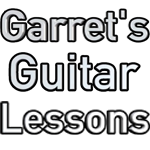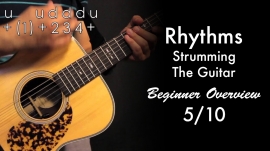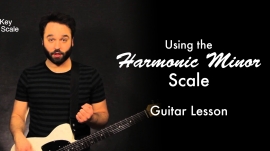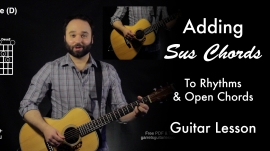So here’s a cool way to use CAGED Chords and learn music theory all at the same time. The idea is to use and memorize one key (this example is using the key of G with the 6th string root) and use our first finger as a “Capo” to play the same progression in all keys… cool!
So we have chords that we turn into “Shapes”
G = I – 1 (G shape)
Am = ii – 2 (Am shape)
Bm = iii – 3 (Am shape up two frets)
C = IV – 4 (C shape)
D = V – 5 (D shape/4th string power chord)
Em = vi – 6 (Em shape)
The Bm (iii) chord is the only chord we have to move our first finger out of it’s normal “capo-esque” position.
We can then play different chord shapes in any key by putting our pinky (root of our G shape) on any key and playing the appropriate chord numbers puts us in that key.
Example: I – V – vi – IV in the key of D
Put pinky on the 6th string 10th fret (D Note) and play – G shape – D shape – Em shape – C shape
*Important – The chords are not “G – D – Em – C” but rather the I – V – vi – IV in the key of D. But we’re thinking of them that way because it’s easier for the time being.
This is related to my “Capo Thinkage” lesson linked below.
This makes playing chord numbers less daunting at first and the more you play a “vi” in the key of D, the more you start putting the pieces together… Bm is the vi of D.
Dig!
-Related Lessons-
0:40 – Major CAGED Chord Shapes | CO 1/10
0:40 – Minor CAGED Chord Shapes | CO 2/10
0:45 – Transposing (Chords as Numbers)?! | UGT 5/8
0:55 – Playing Open Chords | BO 4/10
0:55 – 6th String Barre Chords | BO 9/10
0:55 – 5th String Barre Chords | BO 10/10
1:10 – Transposing (Chords as Numbers)?! | UGT 5/8
1:50 – Major CAGED Chord Shapes | CO 1/10
1:50 – Minor CAGED Chord Shapes | CO 2/10
2:25 – Capo Thinkage (Knowing Your Fretboard)
2:40 – Power Chords (5 Chords)
PDF’s
Using CAGED as Chord Numbers | G1, CAGED Chord Shapes, Open & Barre Chords, Power Chords, Theory & Chord Progressions




